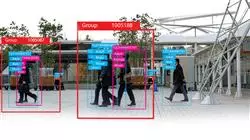University certificate
The world's largest faculty of information technology”
Introduction to the Program
Computer Vision is the technology of the present and the future. Specialize with this program and achieve the professional progress you are looking for"

In recent years, artificial intelligence has brought about a great revolution in the technological world. It has allowed for the development of software and machines that are capable of learning, generating new knowledge and acting according to the best available solution in each case. As such, its applications range from computational sciences, through research in areas such as healthcare, to the development of tools such as vehicles, robots or video games.
It is a field in continuous expansion and is already fundamental in most computer and technology companies. However, precisely because of its great importance and momentum in recent years, specialties have been emerging that focus on one of its specific aspects. Computer Vision is one of the most important of these. This focuses on how machines process the visual information received and how that information can be used, either to improve the machine's own relationship with its own environment by making its operations more accurate, or to collect data efficiently.
For this reason, it is a fundamental field and is closely related to Machine Learning, so more and more companies are looking for computer scientists specialized in this field who can provide the best technological solutions in the development of computer vision projects. This Professional master’s degree offers an in-depth study of this field, bringing you closer to the most innovative knowledge and tools so that, upon completion of the program, you can make immediate professional progress thanks to your new competencies.
And all this will be achieved by following TECH Global University's 100% online methodology, specially designed so that working computer scientists and engineers can balance this program with their jobs, since it adapts to their personal circumstances. In addition, students will be accompanied throughout the learning process by an expert teaching staff and will enjoy the best multimedia teaching resources such as case studies, technical videos, master classes or interactive summaries, among many others.
The future is already here. Do not miss the opportunity and become a leading expert in Computer Vision thanks to this Professional master’s degree"
This Professional master’s degree in Computer Vision contains the most complete and up-to-date educational program on the market. Its most notable features are:
- The development of case studies presented by experts in computer science and computer vision
- The graphic, schematic, and practical contents with which they are created, provide scientific and practical information on the disciplines that are essential for professional practice
- Practical exercises where self-assessment can be used to improve learning
- Its special emphasis on innovative methodologies
- Theoretical lessons, questions to the expert, debate forums on controversial topics, and individual reflection assignments
- Content that is accessible from any fixed or portable device with an Internet connection
Do not wait any longer and specialize in a key area of future technology that will make you advance professionally immediately"
The program’s teaching staff includes professionals from the sector who contribute their work experience to this educational program, as well as renowned specialists from leading societies and prestigious universities.
The multimedia content, developed with the latest educational technology, will provide the professional with situated and contextual learning, i.e., a simulated environment that will provide immersive education programmed to learn in real situations.
This program is designed around Problem-Based Learning, whereby the professional must try to solve the different professional practice situations that arise during the academic year. This will be done with the help of an innovative system of interactive videos made by renowned experts.
Delve into artificial intelligence and Deep Learning and become a reference in the field of Computer Vision"

Enroll now and start developing promising computer vision projects with what you will learn in this program"
Why study at TECH?
TECH is the world’s largest online university. With an impressive catalog of more than 14,000 university programs available in 11 languages, it is positioned as a leader in employability, with a 99% job placement rate. In addition, it relies on an enormous faculty of more than 6,000 professors of the highest international renown.

Study at the world's largest online university and guarantee your professional success. The future starts at TECH”
The world’s best online university according to FORBES
The prestigious Forbes magazine, specialized in business and finance, has highlighted TECH as “the world's best online university” This is what they have recently stated in an article in their digital edition in which they echo the success story of this institution, “thanks to the academic offer it provides, the selection of its teaching staff, and an innovative learning method aimed at educating the professionals of the future”
A revolutionary study method, a cutting-edge faculty and a practical focus: the key to TECH's success.
The most complete study plans on the university scene
TECH offers the most complete study plans on the university scene, with syllabuses that cover fundamental concepts and, at the same time, the main scientific advances in their specific scientific areas. In addition, these programs are continuously being updated to guarantee students the academic vanguard and the most in-demand professional skills. In this way, the university's qualifications provide its graduates with a significant advantage to propel their careers to success.
TECH offers the most comprehensive and intensive study plans on the current university scene.
A world-class teaching staff
TECH's teaching staff is made up of more than 6,000 professors with the highest international recognition. Professors, researchers and top executives of multinational companies, including Isaiah Covington, performance coach of the Boston Celtics; Magda Romanska, principal investigator at Harvard MetaLAB; Ignacio Wistumba, chairman of the department of translational molecular pathology at MD Anderson Cancer Center; and D.W. Pine, creative director of TIME magazine, among others.
Internationally renowned experts, specialized in different branches of Health, Technology, Communication and Business, form part of the TECH faculty.
A unique learning method
TECH is the first university to use Relearning in all its programs. It is the best online learning methodology, accredited with international teaching quality certifications, provided by prestigious educational agencies. In addition, this disruptive educational model is complemented with the “Case Method”, thereby setting up a unique online teaching strategy. Innovative teaching resources are also implemented, including detailed videos, infographics and interactive summaries.
TECH combines Relearning and the Case Method in all its university programs to guarantee excellent theoretical and practical learning, studying whenever and wherever you want.
The world's largest online university
TECH is the world’s largest online university. We are the largest educational institution, with the best and widest online educational catalog, one hundred percent online and covering the vast majority of areas of knowledge. We offer a large selection of our own degrees and accredited online undergraduate and postgraduate degrees. In total, more than 14,000 university degrees, in eleven different languages, make us the largest educational largest in the world.
TECH has the world's most extensive catalog of academic and official programs, available in more than 11 languages.
Google Premier Partner
The American technology giant has awarded TECH the Google Google Premier Partner badge. This award, which is only available to 3% of the world's companies, highlights the efficient, flexible and tailored experience that this university provides to students. The recognition as a Google Premier Partner not only accredits the maximum rigor, performance and investment in TECH's digital infrastructures, but also places this university as one of the world's leading technology companies.
Google has positioned TECH in the top 3% of the world's most important technology companies by awarding it its Google Premier Partner badge.
The official online university of the NBA
TECH is the official online university of the NBA. Thanks to our agreement with the biggest league in basketball, we offer our students exclusive university programs, as well as a wide variety of educational resources focused on the business of the league and other areas of the sports industry. Each program is made up of a uniquely designed syllabus and features exceptional guest hosts: professionals with a distinguished sports background who will offer their expertise on the most relevant topics.
TECH has been selected by the NBA, the world's top basketball league, as its official online university.
The top-rated university by its students
Students have positioned TECH as the world's top-rated university on the main review websites, with a highest rating of 4.9 out of 5, obtained from more than 1,000 reviews. These results consolidate TECH as the benchmark university institution at an international level, reflecting the excellence and positive impact of its educational model.” reflecting the excellence and positive impact of its educational model.”
TECH is the world’s top-rated university by its students.
Leaders in employability
TECH has managed to become the leading university in employability. 99% of its students obtain jobs in the academic field they have studied, within one year of completing any of the university's programs. A similar number achieve immediate career enhancement. All this thanks to a study methodology that bases its effectiveness on the acquisition of practical skills, which are absolutely necessary for professional development.
99% of TECH graduates find a job within a year of completing their studies.
Professional Master's Degree in Computer Vision
Computer Vision has become a fundamental tool for the development of various industries, such as manufacturing, automotive and security. In this context, it is essential that professionals are trained to develop and implement systems that can process, analyze and make decisions based on visual information. TECH's Professional Master’s Degree in Computer Vision is an excellent opportunity to acquire knowledge and skills in this field. This study program, developed by a team of experts in the field, offers a complete and up-to-date education in the use of Computer Vision technologies, delving into topics such as object detection, facial recognition, pattern identification and automation of industrial processes.
You will be at the forefront of the latest advances in Computer Vision
The Professional Master’s Degree in Computer Vision has a 100% online methodology, which will allow you to advance studying without interrupting your work and personal life. In addition, the program offers numerous multimedia resources for learning, such as practical exercises, technical videos and master classes. Upon completion of the program, you will be prepared to apply your knowledge in the industry and perform in areas related to the development of advanced technological solutions and process automation.







